The Quechua: Keepers of the Andean Legacy
Descendants of ancient civilizations, the Quechua have preserved their traditions despite centuries of colonial influence and modernization. They span modern-day Peru, Bolivia, Ecuador, Colombia, Argentina, and Chile and remain one of the most enduring Indigenous groups in South America.
Quechua Culture: A Living Tradition of the Andean Highlands
For centuries, the Quechua people have played a central role in the history and culture of the Andean region. Descendants of ancient civilizations, including the Inca Empire, the Quechua have preserved their language, traditions, and agricultural practices despite centuries of colonial influence and modernization. Spanning across modern-day Peru, Bolivia, Ecuador, Colombia, Argentina, and Chile, the Quechua remain one of the most enduring Indigenous groups in South America. Their resilience and contributions continue to shape the cultural and economic landscape of the Andean world.
Origins and Historical Development
The roots of the Quechua culture stretch back thousands of years, long before the rise of the Inca Empire. The term "Quechua" originally referred to a linguistic group rather than a single ethnic identity. Various pre-Inca civilizations, such as the Wari (circa 600 to 1000 CE) and the Tiwanaku (circa 500 to 1000 CE), spoke early forms of Quechua and contributed to the development of its culture. However, it was during the expansion of the Inca Empire in the 15th century that Quechua became the dominant language and cultural identity across a vast portion of the Andes. The Incas used Quechua as their administrative language, spreading it throughout their empire, known as Tawantinsuyu.
When Spanish conquerors arrived in the 16th century, they initially attempted to suppress Indigenous traditions. However, they soon adopted Quechua as a lingua franca to communicate with local populations. Catholic missionaries used Quechua to convert Indigenous peoples, further cementing its place in South American history. Despite colonial oppression, the Quechua language and customs survived and remain widely spoken today, with millions of speakers across the Andean highlands.
Cultural Traditions and Practices
The Quechua people have long maintained a deep connection to nature, reflected in their spiritual beliefs, agricultural methods, and way of life. Their worldview, or cosmovisión, is rooted in reciprocity and harmony with the land, known as Pachamama, or Mother Earth. Many Quechua rituals and festivals center around agricultural cycles, honoring deities such as Inti, the Sun God, and Apus, the sacred mountain spirits.
Agriculture has been the cornerstone of Quechua society for centuries. The Incas and their predecessors developed advanced farming techniques, including terracing, irrigation systems, and the cultivation of staple crops such as potatoes, maize, and quinoa. These practices remain vital to Quechua communities today, especially in the Andean highlands. The use of llamas and alpacas for transportation and wool production has also persisted for generations.
Quechua textile weaving is one of the most renowned artistic traditions in the Andes. Women, in particular, play a crucial role in this craft, creating intricate patterns that reflect their community's history and identity. Natural dyes from plants and minerals produce vibrant colors, and each textile carries symbolic meaning, telling stories through woven motifs.
Language and Oral Tradition
The Quechua language, one of the oldest Indigenous languages still spoken today, is central to the identity of the Quechua people. It remains an official language in Peru, Bolivia, and Ecuador, though it has historically faced suppression and marginalization. Oral tradition plays a crucial role in preserving Quechua culture, with myths, legends, and songs passed down through generations. Stories of wiracocha (creator gods), heroic figures, and natural phenomena are essential to the collective memory of Quechua communities.
Despite modernization and urbanization, efforts to revitalize the Quechua language and traditions have gained momentum. Schools, cultural organizations, and advocacy groups are promoting Quechua-language education and media to ensure its survival.
Challenges and Modern Identity
The Quechua people continue to face significant challenges in the modern era. Economic struggles, discrimination, and political marginalization remain prevalent, particularly in rural areas. Many Quechua communities have migrated to urban centers in search of better opportunities, leading to concerns about cultural erosion.
However, in recent years, there has been a resurgence of Indigenous pride and activism. Movements advocating for land rights, language preservation, and environmental protection have gained strength. Quechua leaders and scholars are working to ensure that their heritage remains a vital part of national identities in Andean countries.
Conclusion
The Quechua people stand as a living testament to the endurance of Indigenous cultures in South America. From their deep spiritual traditions to their lasting contributions to agriculture, textiles, and language, they have shaped the Andean world for centuries. Despite the pressures of colonization and modernity, the Quechua continue to preserve their heritage and assert their place in contemporary society. Their legacy remains a fundamental part of the cultural fabric of the Andes and beyond.
